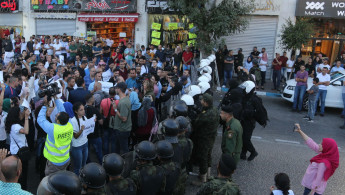Amnesty urges Palestinian Authority to recognise rights of protesters
Rights watchdog Amnesty International on Wednesday urged the Palestinian Authority [PA] to recognise the rights of protesters, ahead of demonstrations in Ramallah in support of besieged Gaza.
The protest, during which Palestinians called for an end to PA-imposed sanctions on Gaza, took place on Wednesday evening in the West Bank.
In its statement, Amnesty called upon the Ramallah-based PA to "exercise restraint and respect human rights, including the right to peaceful protest".
"The Palestinian authorities have an obligation to uphold the rights to freedom of expression and of peaceful assembly," said Saleh Higazi, Head of Office in Jerusalem for Amnesty International. "Palestinians, whose rights that have been routinely crushed by Israel’s occupation, must not be brutalised and repressed by their own government."
The rights group's statement follows the arrest and beating of at least 52 demonstrators and bystanders at a Gaza solidarity protest in June. Among those detained at the Ramallah rally was Amnesty International campaigner Laith Abu Zeyad, who was detained and allegedly beaten by Palestinian authorities.
| Twitter Post |
In its statement, Amnesty highlighted that the Palestinian Authority is obligated to uphold the right of free expression and assembly due to its committment to the main international human rights treaties.
Since June, Palestinians in the West Bank have organised gatherings to protest against PA sanctions on Gaza, which is run by Fatah's rival Palestinian faction Hamas.
Hamas has run Gaza since seizing it from the Fatah-dominated Palestinian Authority amid deadly clashes in 2007.
According to organisers, the PA has sought to apply pressure on Hamas by witholding the wages of over 63,000 government employees, refusing to pay Gaza's electricity bill, and severely limiting support for the coastal strip's healthcare system.
This has worsened conditions for Gazans, who since 2007 have lived under a crippling blockade on Gaza imposed by Israel.
Rights groups say the siege amounts to collective punishment of people in the Gaza strip, an area the UN says will be "unliveable" by 2020.





 Follow the Middle East's top stories in English at The New Arab on Google News
Follow the Middle East's top stories in English at The New Arab on Google News


